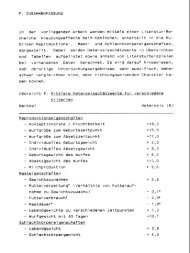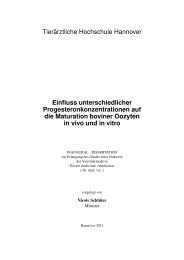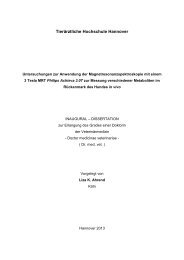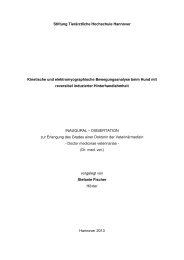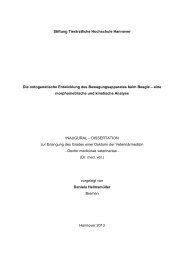TiHo Bibliothek elib - Tierärztliche Hochschule Hannover
TiHo Bibliothek elib - Tierärztliche Hochschule Hannover
TiHo Bibliothek elib - Tierärztliche Hochschule Hannover
You also want an ePaper? Increase the reach of your titles
YUMPU automatically turns print PDFs into web optimized ePapers that Google loves.
Summary<br />
Kapitel 8 Summary<br />
Janina Bartels: Detection of the Chemokine MIP-3β/CCL19 in cerebrospinal fluid<br />
and its association with the invasion of mononuclear cells in<br />
neuroinflammatory and non-neuroinflammatory diseases in dogs.<br />
Chemokines are important factors for the cell migration and pathogenesis of<br />
inflammatory reactions in the central nervous system (CNS). They can be upregulated<br />
in tissues under pathologic conditions. Certain chemokine gradients can<br />
influence the cell migration and lead to the activation of immune cells. The first<br />
aspect of this study covered the quantification of chemokine MIP-3β (macrophage<br />
inflammatory protein-3 beta)/CCL19 concentrations in the cerebrospinal fluid (CSF)<br />
and serum samples in dogs with inflammatory and non-inflammatory diseases of the<br />
central nervous system (CNS).<br />
The second aspect of this study addressed the determination of the chemotactic<br />
activity of mononuclear cells induced by CSF containing elevated MIP-3β/CCL19<br />
concentrations. The hypothesis should be proven that MIP-3β/CCL19 concentrations<br />
are increased in CSF samples of selected neurological diseases and that higher<br />
concentrations of MIP-3β/CCL19 within the CNS induce mononuclear cell migration.<br />
MIP-3β/CCL19 concentration measurements were performed using a commercially<br />
available ELISA in 141 paired serum and CSF samples of dogs. Elevated MIP-<br />
3β/CCL19 values could be measured in CSF samples of dogs with inflammatory and<br />
non- inflammatory neurological diseases. MIP-3β/CCL19 CSF concentrations in dogs<br />
with steroid-responsive meningitis-arteritis (SRMA) and meningoencephalitides of<br />
unknown origin (MUO) were significantly higher compared to the control group<br />
consisting of healthy dogs and patients with idiopathic epilepsy (p < 0.001 ; median<br />
CCL19 concentration SRMA: 1690 pg / ml; MUO: 373.5 pg / ml).<br />
Additionally, a significant correlation between MIP-3β/CCL19 CSF concentrations<br />
and CSF cell count in dogs affected with SRMA and MUO (SRMA r = 0.82, p



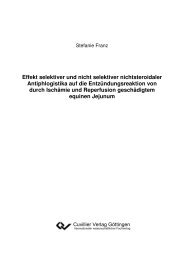
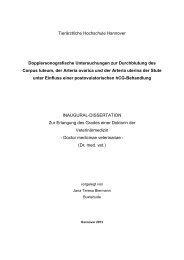

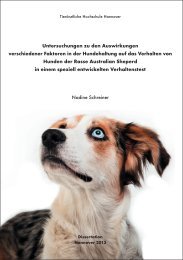
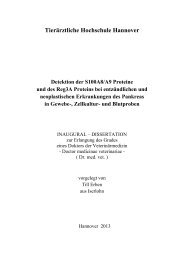


![Tmnsudation.] - TiHo Bibliothek elib](https://img.yumpu.com/23369022/1/174x260/tmnsudation-tiho-bibliothek-elib.jpg?quality=85)
